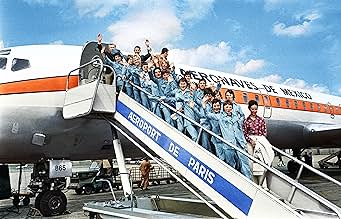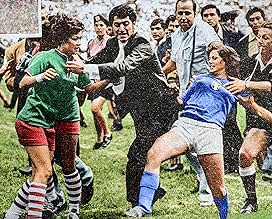Told by the pioneering women who participated, this is the extraordinary story of the 1971 Women's Soccer World Cup, a tournament witnessed by record crowds that has been written out of spor... Read allTold by the pioneering women who participated, this is the extraordinary story of the 1971 Women's Soccer World Cup, a tournament witnessed by record crowds that has been written out of sporting history - until now.Told by the pioneering women who participated, this is the extraordinary story of the 1971 Women's Soccer World Cup, a tournament witnessed by record crowds that has been written out of sporting history - until now.
- Directors
- Writers
- Stars
- Awards
- 2 wins & 10 nominations total
- Directors
- Writers
- All cast & crew
- Production, box office & more at IMDbPro
Featured reviews
You would have to be mad not to have come to the conclusion that FIFA is populated with grey, humourless, rule-book wielding bureaucrats. And thats not to even mention the corruption, what with the bribes, the thousands of migrant workers dead building large stadiums when a rich desert country with no interest in football was awarded a World Cup or what about when Legia Warsaw unveiled a huge banner to commemorate the murdered 160,000 Poles by the Nazis in the Warsaw Uprising - FIFA's response to this act of education and remembrance? A £42,000 fine for Legia Warsaw of course! But don't worry because this film clearly indicates that FIFA were also 24 carat bell-ends way back in 1971 as well! Well, consistency is a positive attribute of sorts I guess.
This film tells a pretty amazing story in a lot of ways. Amazing because hardly anyone seems to have known a thing about it for 50 years. It's the story of the first women's World Cup which happened way back in 1971. But it doesn't count as the first women's World Cup...because FIFA didn't 'approve' it. Furthermore, they insisted that the Mexican clubs pencilled in to host the thing must under no circumstances do so or face heavy fines. Ironically, their petty intransigence led to the tournament being forced to be played out in the two largest stadiums in the country which were not under FIFA jurisdiction, including the iconic Azteca stadium in Mexico City. Whats actually fairly incredible was that the promoters succeeded epically in selling the tournament and games played out to crowds of 110,000 in an uproarious atmosphere. The competition itself looked amazing and, like the legendary men's World Cup of 1970, clearly benefitted from being played out in such a passionate environment. There are silky skills, 1970's assaults...I mean legitimate tackles, an unfeasibly bad tempered semi-final between Italy vs Mexico where in one photograph we have the brilliantly incongruous sight of an Italian player who looks like Claudia Cardinale being held back from physically assaulting a Mexican opponent, there's a pay strike on the eve of the final, there's amazing goals chalked off for questionable technicalities and its all narrated by gloriously over-the-top Latin football commentary - in other words, its entertainment all the way! The tournament even had a super-cool looking mascot!
So, you may think, this is great - football at its most life-affirming! This will take the game forward! Meanwhile, back in Switzerland...FIFA continued to take the huff. The women received bans, some were barely acknowledged in their own countries for their efforts and many became quickly disillusioned with the game due to some very poor treatment. The tournament was to all intents and purposes buried. The doc is made up of the remembrances of many of the participants from the various competing teams. I found all these women to be full of humour and vitality. They have been treated pretty poorly though. It wasn't until 20 years after this event that the first official FIFA sponsored women's World Cup took place. To me, it seems like a no-brainer for this to now be officially regarded in the history books as the first female World Cup - after all, the first men's one in 1930 was invitation only and that's official. You would think after all the things they have got so epically wrong over the last few years that FIFA could do something positive, do the right thing and make this tournament official...but will they?
This film tells a pretty amazing story in a lot of ways. Amazing because hardly anyone seems to have known a thing about it for 50 years. It's the story of the first women's World Cup which happened way back in 1971. But it doesn't count as the first women's World Cup...because FIFA didn't 'approve' it. Furthermore, they insisted that the Mexican clubs pencilled in to host the thing must under no circumstances do so or face heavy fines. Ironically, their petty intransigence led to the tournament being forced to be played out in the two largest stadiums in the country which were not under FIFA jurisdiction, including the iconic Azteca stadium in Mexico City. Whats actually fairly incredible was that the promoters succeeded epically in selling the tournament and games played out to crowds of 110,000 in an uproarious atmosphere. The competition itself looked amazing and, like the legendary men's World Cup of 1970, clearly benefitted from being played out in such a passionate environment. There are silky skills, 1970's assaults...I mean legitimate tackles, an unfeasibly bad tempered semi-final between Italy vs Mexico where in one photograph we have the brilliantly incongruous sight of an Italian player who looks like Claudia Cardinale being held back from physically assaulting a Mexican opponent, there's a pay strike on the eve of the final, there's amazing goals chalked off for questionable technicalities and its all narrated by gloriously over-the-top Latin football commentary - in other words, its entertainment all the way! The tournament even had a super-cool looking mascot!
So, you may think, this is great - football at its most life-affirming! This will take the game forward! Meanwhile, back in Switzerland...FIFA continued to take the huff. The women received bans, some were barely acknowledged in their own countries for their efforts and many became quickly disillusioned with the game due to some very poor treatment. The tournament was to all intents and purposes buried. The doc is made up of the remembrances of many of the participants from the various competing teams. I found all these women to be full of humour and vitality. They have been treated pretty poorly though. It wasn't until 20 years after this event that the first official FIFA sponsored women's World Cup took place. To me, it seems like a no-brainer for this to now be officially regarded in the history books as the first female World Cup - after all, the first men's one in 1930 was invitation only and that's official. You would think after all the things they have got so epically wrong over the last few years that FIFA could do something positive, do the right thing and make this tournament official...but will they?
This is a documentary film of the 1971 Women's World Cup in Mexico. This opens with an interview with Brandi Chastain. The interviewer shows her footage from a 1971 game and she is shocked. She had never seen nor known of such an event.
This is amazing true history that apparently nobody but only those who witnessed it would remember. This does a great job documenting it with the ladies. I would like more from the men who created it and ran it. There is more story from that angle especially after the event. I want to know who and how this event was essentially erased. There needs to be more revelation than The Men. I would also like to know where that trophy is now.
This is amazing true history that apparently nobody but only those who witnessed it would remember. This does a great job documenting it with the ladies. I would like more from the men who created it and ran it. There is more story from that angle especially after the event. I want to know who and how this event was essentially erased. There needs to be more revelation than The Men. I would also like to know where that trophy is now.
If this documentary is not nominated to an Oscar or an Emmy, it is a crime.
The subject is quite niche but the undertones of a social statement are there. It's denouncing one of the greatest injustices in sports history. To think this was hidden for so many years just because it was a woman's event it's almost unbelievable.
The first hands stories of these pioneers are grappling and inspiring.
The perspective of those who comment through experience and how they got to the 71 event makes this probably the best sports documentary ever made.
If you believe in social causes, football, or just plain storytelling, this is it.
The subject is quite niche but the undertones of a social statement are there. It's denouncing one of the greatest injustices in sports history. To think this was hidden for so many years just because it was a woman's event it's almost unbelievable.
The first hands stories of these pioneers are grappling and inspiring.
The perspective of those who comment through experience and how they got to the 71 event makes this probably the best sports documentary ever made.
If you believe in social causes, football, or just plain storytelling, this is it.
It's quite interesting that even now, there are those amongst the footballing establishment who dismiss this competition as little better than an unsanctioned exhibition event of no consequence whatsoever. If you watch it, however, you can't help but get a sense of the pride with which the women from six teams assembled in Mexico to play. James Erskine et al has done a quite an effective job tracking down many of the players who took part and at finding some grainy, but perfectly watchable, archive of the games and of the celebratory nature of the hosting country back in 1971. The narrative and commentaries take a pretty firm swipe at the men-only culture that prevailed in the sport - and amongst most of their advising medical professionals - which limited women's participation in the sport and though the film make precisely no attempt to balance it's clear objective with any counter-arguments about the perceived dangers to women players, or feature any interviews with anyone from FIFA or UEFA regarding their decision making rationale, this still makes for quite a powerful depiction of just how inclusive football, as a sport, can be. The contributors are engaging and as one Dane points out - she can knit and she can use a chainsaw, so why not play football?
"Copa 71" premiered at TIFF last month, and made its US debut at DocFest as part of the Seattle Independent Film Festival. It received rave reviews at both, so it's telling that as of this writing it's currently rocking a 4.5/10 on IMDb for what is probably the most egregious sin of all-- treating women like human beings.
The film has one primary focus, as shown in the title: In 1971, in Mexico City and Guadalajara, a non-FIFA Women's World Cup was held. Six teams were invited, and where the tournament holders imagined it a sideshow, they had dollar signs in their eyes and stadiums to fill (FIFA denied them the use of the regular stadiums, so they were 'forced' into the two largest stadiums in the country).
As a film, its focus is narrow, but that singular focus is so utterly fascinating, and the players so passionate, that this is hardly a complaint. The burial of this sporting event is mentioned barely at all, the film doesn't even make mention of the next (also overlooked) women's tournament in 1985, skipping to the first official FIFA sanctioned event in 1991.
These are minor concerns, as the film is necessary both as an educational tool, and as a historical document. I'm male, I've got a basic familiarity with soccer, but like all great sports documentaries, you can go in blind and be captivated by the story they're trying to tell, regardless. Yes, the open sexism these women had to deal with is still alive and well (see: the current IMDb rating), but that is less the focus than the very real fact that even in 1971, women playing soccer sold out a 110,000 seat stadium.
You can't not love these women, unless you're the unfortunate type of person who never cared for women in the first place. If that's you, you don't need to review bomb, just find something else to be mad about. Women's soccer is the fastest growing sport in the world, and this documentary is a testament that it's been a long time coming.
The film has one primary focus, as shown in the title: In 1971, in Mexico City and Guadalajara, a non-FIFA Women's World Cup was held. Six teams were invited, and where the tournament holders imagined it a sideshow, they had dollar signs in their eyes and stadiums to fill (FIFA denied them the use of the regular stadiums, so they were 'forced' into the two largest stadiums in the country).
As a film, its focus is narrow, but that singular focus is so utterly fascinating, and the players so passionate, that this is hardly a complaint. The burial of this sporting event is mentioned barely at all, the film doesn't even make mention of the next (also overlooked) women's tournament in 1985, skipping to the first official FIFA sanctioned event in 1991.
These are minor concerns, as the film is necessary both as an educational tool, and as a historical document. I'm male, I've got a basic familiarity with soccer, but like all great sports documentaries, you can go in blind and be captivated by the story they're trying to tell, regardless. Yes, the open sexism these women had to deal with is still alive and well (see: the current IMDb rating), but that is less the focus than the very real fact that even in 1971, women playing soccer sold out a 110,000 seat stadium.
You can't not love these women, unless you're the unfortunate type of person who never cared for women in the first place. If that's you, you don't need to review bomb, just find something else to be mad about. Women's soccer is the fastest growing sport in the world, and this documentary is a testament that it's been a long time coming.
Did you know
- TriviaCarol Wilson, who played was the England captain in the tournament, was only 19 years old at the time. Three of her teammates, Leah Caleb (age 13), Gill Sayell (14) and Chris Lockwood (15) were still schoolgirls when they played in the tournament.
- How long is Copa 71?Powered by Alexa
Details
- Release date
- Country of origin
- Official sites
- Languages
- Also known as
- Copa '71 - succén som tystades ner
- Production companies
- See more company credits at IMDbPro
Box office
- Gross worldwide
- $197,067
- Runtime1 hour 30 minutes
- Color
- Aspect ratio
- 2.00 : 1
Contribute to this page
Suggest an edit or add missing content

























